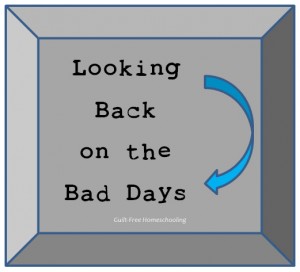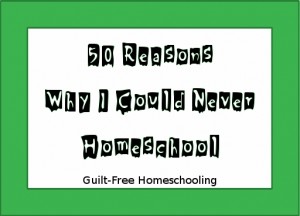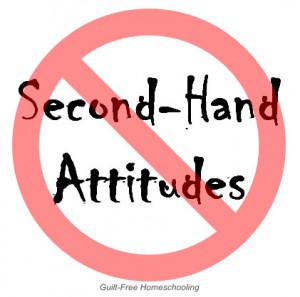This post will be different from my normal entries, so bear with me. This will start on quite a negative focus, but I promise to turn it positive before the end. The reason for this post is that I have been asked recently in multiple ways whether I actually had any bad days in homeschooling. Oh, let me tell you.
There was no book available to encourage me that I could homeschool Guilt-Free. When I tried to solicit advice from veteran homeschoolers, they seemed to look at me as though I must be doing something horribly wrong if I was feeling guilty or insufficient as a teacher for my children. I read everything that I could get my hands on about homeschooling, but I still did not find anything referencing the daily grind of teaching my children or how much I would wish that the Fairy Godmother of Homeschooling could show up and wave her magic wand, making everything work as perfectly as the homeschool magazines portrayed.
Off to a Bad Start
In trying to decide whether or not we should even attempt homeschooling, my husband and I attended a small homeschooling conference. Hearing everything that I needed to hear, I was quickly convinced that homeschooling could work for us and would for us. I purchased a couple of items from the vendor hall that either looked fabulous to me or that I had heard other families raving about. Big mistake. What I bought with eagerness and confidence turned out to be a dreadful waste of money. I later resold them to some other unsuspecting families. More guilt for doing that. I recouped some of my money, but not until several years later. The nagging guilt that my first homeschool purchases were so foolishly impulsive was also embarrassing. You would expect that I had learned that lesson then, but you would be wrong. I later made other purchases of clever-looking gadgets and highly touted, expensive books, only to be disappointed when they proved themselves to be limited in scope and insufficient for our needs. How would I ever figure out what to buy? How could I know what would work with my children? How much money would I waste in the process?
As we jumped from book to book, trying to find what we needed to fill the gaps left by insufficient public school experiences, I saw little consistency in our curricula, but since we had not begun homeschooling from Kindergarten onward, what else could we do? I did not know what my children knew, and I had no way of determining what they did not know or what materials would meet our needs, other than through trial and error. Was it too soon to change? Was it too late to change? How many times would we change materials before we found something that worked? Would we ever find something that worked? How would I know if I was doing things right?
Past Regrets
We trudged through our first years of homeschooling, and at times, it felt very much like slogging through knee-deep mud while trying not to lose your shoes. The good days and the “aha” moments kept us going. Even my children recognized that they were learning more at home than they had learned in public school, and for the most part, they were enjoying being at home much more than they had liked being at school. However, as time went by, I began to learn more about their negative experiences at school. Why had I not been more involved in my children’s schooling before? What other things had taken place that I knew nothing about? As if my inept-homeschooler guilt was not enough by itself, now I had retroactive guilt about their public school experiences as well.
My husband also confided to me that he had wanted to begin homeschooling several years before we actually did begin, but he had not suggested it to me because he felt it was a tremendous burden to drop on me. That actually increased my guilt even more: he was so sweet in not wanting to pressure me, but had I been so shallow that I had not seen the need that my children had for better education?
Daily Agony
So there I was, finally committed to homeschooling my children, but fearful of what the future would hold. I could barely get through each day without becoming upset over my own inabilities, my children’s lack of determination and discipline, or our tight quarters that kept us too close for comfort. We needed more space, and we needed more guidance, and we got neither. When I caught myself snapping and yelling at my children, who had really done nothing wrong, I often just abruptly ended lessons for the day and let the children go off to play. I reasoned that we would be better off getting away from each other for a while, than if we continued in our current downward spiral. Besides, it was too hard to see the lessons through all of our tears of frustration. The Bible says, “As iron sharpens iron, so one man sharpens another.” Well, the sparks flying from us must have looked like a fireworks display.
We set up a “schoolroom” in our enclosed back porch, using a folding table and long benches down two sides. The children’s restless legs often swung back and forth under the table, frequently landing blows on the unsuspecting sibling. I had to order that child to the far end of that bench and this child to the opposite end of this bench until they learned to respect the space limitations. I soon discovered that classroom models do not work well at home, and I allowed my students to take stretch breaks as often as they needed them. Our close quarters also prompted a large number of face-making taunts and distractions, so I rigged up a temporary visual barrier down the middle of the table until my students learned to adapt to their new environment. Once they learned to cooperate with each other and be responsible for completing their own lessons, I rewarded them with the privilege of taking an assignment to another location, but the progress was not instantaneous.
I would threaten my children with sending them back to public school if they did not do their lessons for me, but they saw that as the empty threat it was, since they knew we had begun homeschooling after the public schools had failed to meet our needs. I felt so trapped, and I was sure that my children felt just as despondent. We had thought that education at home would be the solution to all of our problems, but, while it did solve those previous problems, it had also created many more problems of its own. What had I gotten myself into? How would I ever get through this? Were my children actually learning anything of consequence? Were we doing enough? Should we be doing more? How could we handle anything more?
I began to feel invisible — like I had ceased to exist as a person. I was 100% dedicated to serving my husband and children as a wife, mother, and now homeschool teacher, but there was no time left over for me to be me. I had previously enjoyed multiple hobbies — sewing, needlework, crafts, reading, music — but any outside activities that I did manage to squeeze in were still focused on homeschooling: reading information on homeschooling, making manipulatives that we could not afford otherwise, or writing my own homeschool lessons when I could not find appropriate materials. I felt selfish for wanting time to myself, but I did wonder if I would ever get to be a real person with my own identity again.
Our “Groove” Became a Rut That Others Tripped Over
After a few of years of homeschooling, we finally felt like we were getting the hang of this business. We had dropped a lot of the trappings of schoolishness and were finding our own way — a way that suited us and worked for us. At that time, we decided to join a large group of other homeschooling families who got together regularly for planned activities and cooperative classes. How exciting — like-minded families, full of the joy of home education, eager to get together to share the fun of learning. About that same time, we were becoming very confident with our own methods of homeschooling. We met families who shared similar backgrounds to ours (those of us who left public school for homeschooling were a definite minority) and consoled each other with our personal tales of how we had survived thus far. [I have seen a dramatic difference between homeschooling after attending school and homeschooling without ever attending school. Maybe their grass just looks greener from here, but in my opinion, families in the second category have far fewer problems to overcome.]
As I had analyzed the materials available for seventh and eighth grade, I saw that many textbooks repeated the same standard information with little change. I decided to leave the textbooks behind for history and science and let my daughter read biographies instead. She suddenly came alive and began devouring the plan I had set before her. She accomplished so much that year, that she essentially completed both 7th and 8th grades in one year’s time. I was ecstatic. I could not wait to share her achievements with my friends in our new group, but they were less than thrilled to hear my news. Instead of rejoicing with me that we were finally “getting it” and beginning to make some real progress in this thing called homeschooling, our friends seemed resentful and jealous. I was certainly not trying to exhibit one-upmanship over them, and I was not at all bragging that my child was doing better than their children were doing. I was just doggone proud that my little girl was now doing so much better than my little girl had ever done before. They did not see it that way. They looked at me as if we had cheated by skipping over a grade. Had I done something wrong by designing an educational plan just for her? Were the “homeschool cops” going to beat a path to my door for violating academic protocol? She was finally learning — eagerly — how could that be so wrong?
Silver Linings
This has been a difficult time of reflection for me, looking back over what I have considered to be my failures in homeschooling. As much as I may want to say “and we all lived happily ever after,” that is not an appropriate conclusion. I cannot leave the mothers hanging who are also white-knuckling their ways through each day’s lessons. I cannot wrap this up without trying to explain how we turned things around for ourselves.
First, I gave myself the gift of time. I needed time to learn how to teach my children: I had never been a teacher before. My students needed time to learn how to do lessons on their own, without a roomful of classmates to rely on: they had never experienced learning independently before. I stopped expecting instant, large-scale results and began looking for tiny indications of daily or weekly progress. Homeschooling really does get easier the longer you do it, because you learn what to do, what not to do, and how to do it all together.
Next, I expanded my teaching staff to include my students. Classroom methods for teaching and learning are typically unsuitable for homeschooling. If I had to pick one thing I did that led to success in homeschooling, it was to abandon all preconceived ideas of what “school” should be like and to build a new plan that fit us. I looked at my students and talked with my students to determine where their strengths were and where their weaknesses were. We worked together to use their strengths to build up their weaknesses. I apologized to them for the mistakes I made and for pushing them too hard. They forgave me. Every time. We worked together to determine how our homeschooling days should proceed. I gave them some responsibility for their own education: I let them be partners with me in planning what we would do and how we would do it. We learned together. We succeeded together.
As for “my” time, I realized that it was necessary for me to focus on my family and their needs for each day and that my own time would come later. As my students became more comfortable with the methods of homeschooling, they also became more independent in their learning. They asked for and received permission to take lessons away from our communal school area and go to their bedrooms or other private areas to study. I was still available for help and direction when they needed it, but they needed less help with each passing year. They were also able to help me with household chores, taking over the less-Mom-intensive tasks and freeing me for the more complicated jobs. Their assistance in daily chores taught them responsibility and gave me just enough free time to keep me from going completely crazy.
If you have found yourself overwhelmed, awash with tears, or engaged in shouting matches with your students, be assured it will get easier. My guess is that you are still in the early stages of your homeschooling career, and I promise you that things will improve with time. (I cannot repeat often enough that everyone’s first year of homeschooling is the toughest.) For now, take a little time off — skip a day of lessons and play games, watch videos, or go on a picnic. Do something to enjoy each other’s company and clear your heads. Leave the stress behind, Guilt-Free. When you come back to your lessons, try a different approach. Get out the Monopoly money and help your child practice math by counting, sorting, and making change with it. Instead of a dry history textbook, head to the library and look for biographies of people you find interesting. Play Scrabble. Play tag. Use your imaginations, and let your scheduled plans fall by the wayside for a while. Get to know each other better, and share ideas for what would help to make your school days more enjoyable.
Take some time to observe your children and evaluate their good points and their bad points. Then go to the nearest school and watch those students as they leave for the day. Go to a shopping mall on a weekend and spend some time people-watching (specifically teen-watching). Repeat these steps until you are convinced that your meager efforts in homeschooling are producing a quality product. If you are satisfied with the citizens your children are becoming, then assure yourself that you are doing it right and you are doing enough.
Feelings of guilt regarding your homeschool are quite often the result of trying to live up to someone else’s standards. Ignore those people. Remind yourself of why you have chosen to homeschool and what you hope to gain by homeschooling. Focus on meeting your own goals, not anyone else’s. Draw confidence from the progress you have already made, and look carefully for the small signs of progress that you are making each day, each week, each month.
I had to learn that homeschooling was not a sprint: it was a marathon. The important thing was not how quickly we could leave the starting blocks or how much progress we could make in the first lap. Our success in homeschooling came from setting a pace that we could maintain and then enjoying the scenery as we sustained forward motion. I stumbled many times as I began teaching my children at home. Even after I had established a semi-smooth gait, we still tripped over occasional potholes and obstacles. I dared not think about how much distance we had left to cover, but I kept my focus on how far we had already come and how the steep hills and deep valleys were settling into a smoother plane. Now we can look back over those difficult days at the beginning and say that we “ran with endurance the race set before us.” We have made it to the Finish Line. And so can you.






 Guilt-Free Homeschooling is the creation of Carolyn Morrison and her daughter, Jennifer Leonhard. After serious disappointments with public school, Carolyn spent the next 11 years homeschooling her two children, from elementary to high school graduation and college admission. Refusing to force new homeschooling families to re-invent the wheel, Carolyn and Jennifer now share their encouragement, support, tips, and tricks, filling their blog with "all the answers we were looking for as a new-to-homeschooling family" and making this website a valuable resource for parents, not just a daily journal. Guilt-Free Homeschooling -- Equipping Parents for Homeschooling Success!
Guilt-Free Homeschooling is the creation of Carolyn Morrison and her daughter, Jennifer Leonhard. After serious disappointments with public school, Carolyn spent the next 11 years homeschooling her two children, from elementary to high school graduation and college admission. Refusing to force new homeschooling families to re-invent the wheel, Carolyn and Jennifer now share their encouragement, support, tips, and tricks, filling their blog with "all the answers we were looking for as a new-to-homeschooling family" and making this website a valuable resource for parents, not just a daily journal. Guilt-Free Homeschooling -- Equipping Parents for Homeschooling Success!

Recent Comments